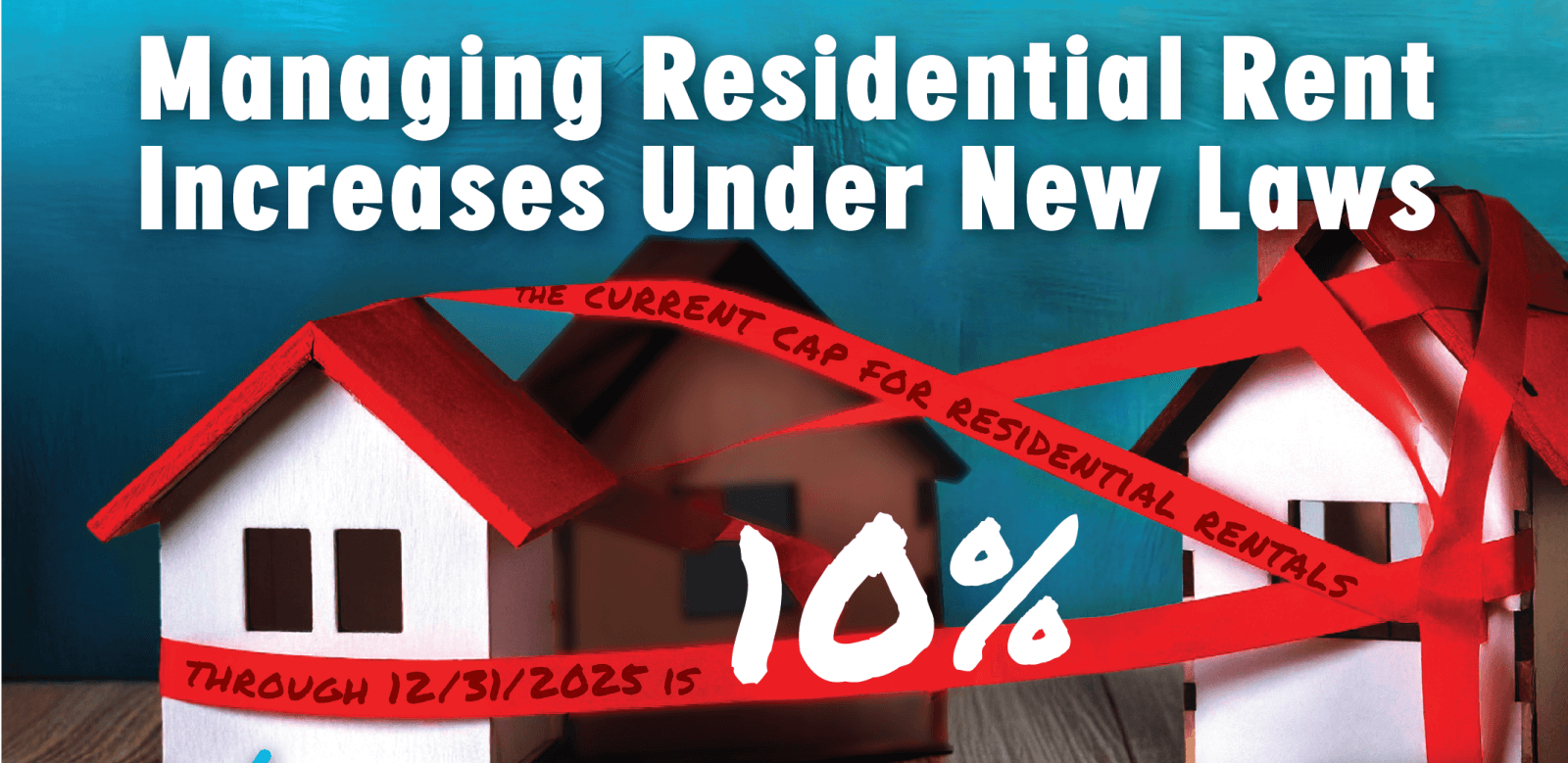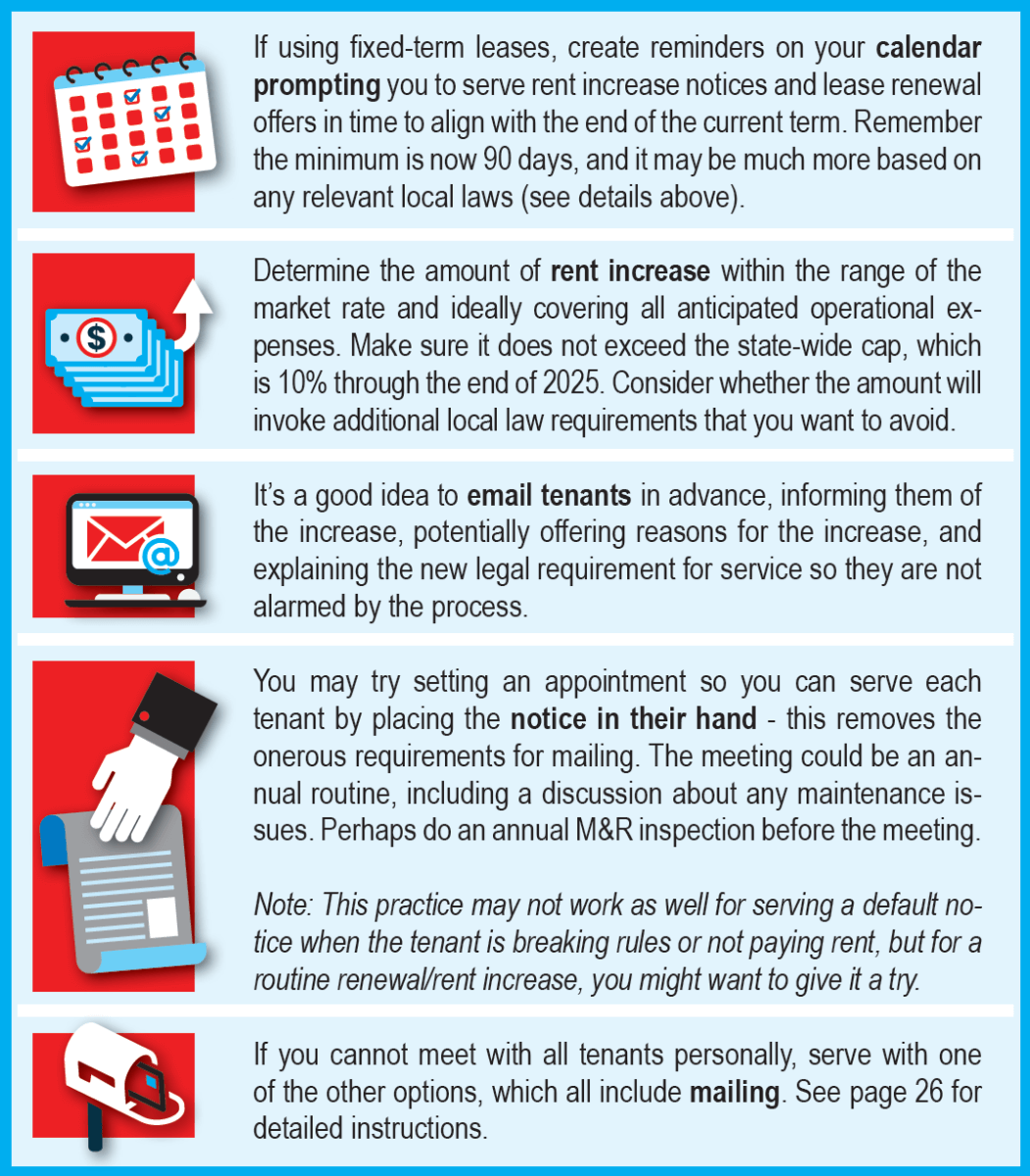Managing Residential Rent Increases Under New Laws

From 5/7/2025 through 12/31/2025, the rent increase cap is 10%.
From 1/1/26 through 12/31/26, the rent increase cap is 9.683%
It is a best practice for housing providers to adjust rent regularly, keeping rents in the range of the area market rate. Housing providers that keep rents lower than the market rate in order to keep long-term tenants will quickly find themselves in a situation where they need to contribute money to the property for ongoing maintenance, and to cover increasing operating costs such as taxes, insurance, and administration, like having to serve notices via Certified Mail!
It is important to create and document your rent increase policies to follow all state and local government regulations on increasing rent. First, let’s look at the new and existing laws that govern rent increases across the state, then go over the steps and best practices for giving rent increases.
RENT INCREASE REQUIREMENTS FOR ALL RESIDENTIAL TENANCIES:
RCW 59.18.140 + EHB 1217 (WA 2025); and 59.12.040 + EHB 1003 (WA 2025)
-
Definition: "Rent" or "rental amount" means recurring and periodic charges identified in the rental agreement for the use and occupancy of the premises, which may include charges for utilities. This does not include non-recurring charges for costs due to late payment, damages, deposits, legal costs, or other fees, including attorneys' fees. (RCW 59.18.030)
-
Minimum notice for rent increase is 90 days.
• If the rental agreement governs a subsidized tenancy where the amount of rent is based on the income of the tenant or circumstances specific to the subsidized household, a landlord shall provide a minimum of thirty days' prior written notice of an increase in the amount of rent to each affected tenant. -
Any increase in the amount of rent may not become effective before the completion of the term of the rental agreement.
-
You must use a specific rent increase notice form included in the statute, EHB 1217 (WA 2025).
• The RHAWA Rent Increase Notice complies with the statute. -
No rent increase can be given in the first 12 months of tenancy.
• Per the new statutory form, but not actually spelled out in law, only one rent increase can be given in any 12-month period after the first 12-month period. -
Rent increase notice must be served like an eviction notice per RCW 59.12.040.
• (See “Serving Notices Under New Law” on page 27.) -
New service requirements effective 7/27/2025 under HB 1003 require mailing by Certified Mail, although no longer within the same County.
-
Rent increase is limited to 7% + Consumer Price Index (CPI) or 10%, whichever is less, per 12-month period.
• For each calendar year, the CPI number to be referenced will be selected and announced by the Department of Commerce (DOC) at www.commerce.wa.gov/housing-policy/hb1217-landlord-resource-center/-
-
From 5/7/2025 through 12/31/2025, the rent increase cap is 10%.
-
From 1/1/26 through 12/31/26, the rent increase cap is 9.683%
-
-
-
The law prohibits offering any incentives based on length of term or month-to-month status other than a 5% difference in monthly rent amount.
• If offering an incentive in an existing tenancy, the higher offer must conform with the rent increase limit, 7% + CPI.
Note: The tenant should give a “notice to cure” to the landlord who increases rent unlawfully. Even without, AG can still bring enforcement action, including refunding rent, penalties up to 3 months’ rent, a $7500 fine per infraction, attorney fees, and court costs.
Lease Renewal Laws
If you have a term lease, you cannot unilaterally raise the rent mid-term. To require a tenant to sign a lease renewal rather than going into a month-to-month tenancy, RCW 59.18.650(1) stipulates that you serve an “end of term” notice at least 60 days prior to the end of the term. Per the End of Term Notice, the tenant must sign before the end of the term, or they must vacate.
Under EHB 1217 in effect on 5/7/2025, if the lease renewal offer includes a rent increase, notice of that increase must be served 90 days before the end of the term.
If an extended rent increase notice is required under a local government law, the rent increase notice should be given first, and then the lease renewal with a copy of the rent increase notice form attached. Use the RHAWA form, End of Term Notice with Lease Extension, following the provided instructions.
Local Government Regulations
Even though we now have statewide rent control, RCW 35.21.830 still prohibits cities or counties in Washington from implementing their own rent increase caps. However, several local governments have enacted laws that require extended notice periods for rent increases and other measures intended to complicate the process for increasing rent.
The most ubiquitous rent increase rule that will still be in effect on top of the new state law is:
“Any total rent increase greater than 3% requires 120 days’ notice.” This rule applies in the cities of Issaquah, Kenmore, Kirkland, Port Townsend, Redmond, SeaTac, and Woodinville, plus all unincorporated areas of King County.
The next most common additional rule is: “Any total rent increase greater than 5% requires 120 days’ notice,” adopted by the cities of Auburn, Olympia, and Tumwater.
And a few more cities have their own unique set of rules:
- City of Bellingham: Any total rent increase requires 120 days’ notice. If the total rent increase is 8% or more over a 12-month rolling period, the notice shall include a number of additional details, including a rationale for the rent increase and information about Bellingham’s Economic Displacement Relocation Assistance (EDRA) program.
- City of Seattle: Any rent increase requires 180 days’ notice. If the postal service used for mailing notice requires a signature, notice must also be sent by regular first-class mail. If the increase is for 10%, the notice must also include Seattle’s EDRA Notice.
- City of Shoreline:
-
- “Base Rent” means a recurring and periodic charge identified in the rental agreement for use and occupancy of a dwelling or dwelling unit. Base Rent may include charges for utilities, but does not include those charges defined as Optional Rent.
- “Optional Rent” means recurring and periodic charges identified in the rental agreement that are not required for use and occupancy but that a tenant voluntarily agrees to, such as charges for a parking space or a pet.
- “Rent” means the total combined amount of Base Rent and Optional Rent.
- Any “Base Rent” increase greater than 3% but less than 10% requires 120 days written notice.
- Any “Base Rent” increase of 10% requires 180 days’ notice.
- Any “Optional Rent” increase of any amount requires at least 60 days’ prior written notice to each affected tenant. (New state law increases this to 90 days.)
- City of Spokane: 120-day notice for rent increase equal to or less than 3%; 180-day notice for increase greater than 3%.
- City of Tacoma: Use the RHAWA form complying with State law and also use the forms provided by the City of Tacoma at City of Tacoma rental housing code and outlined by RHAWA at RHAWA - Tacoma rent increase notices.
NOTE: Several local governments have laws that are the same as the new state law (e.g., RCW 59.12.040 service required) or are superseded by more tenant-friendly state law (e.g., allowances for rent increases greater than 10%). These obsolete regulations have been omitted from the above to avoid confusion. The City of Burien rescinded BMC 5.63.100 – Rent increases on May 19, 2025.
Basic Steps and Best Practices for Increasing Rent

Remember, do not do any rent increases during the first year of tenancy, and for now, only do one increase per 12-month period (this may change — fingers crossed!).
Lease Renewals or Rules Changes without Rent Increases
If no rent increase is needed on a lease renewal and you are enforcing fixed lease terms, send a lease renewal offer with more than 90 days’ notice. If the tenant does not sign, serve an End of Term Notice with Lease Renewal (RHAWA form). If they do not sign in 30 days, you can reinforce this by serving an End of Tenancy Notice (RHAWA form) with selected cause k. Resident fails to sign a new rental agreement, etc. by the end of the term (make sure to email some reminders), you can have your attorney proceed with an unlawful detainer. You can change nonrent related rules at lease
renewal, or in a month-to-month tenancy using a 30-day Rules Change in Terms of Tenancy Notice.
Document Your Rent Increase Practices
RCW 59.18.240 prohibits the landlord from retaliation or making reprisals against the tenant in response to the tenant doing anything that was within their rights to do. Retaliatory actions include rent increases. RCW 59.18.250 states that if a landlord takes an adverse action (such as a rent increase) within 90 days of a tenant exercising their rights, such as making a fair housing complaint, there is a rebuttable presumption that the landlord is guilty of retaliation, and the burden of proof is on the landlord. Similarly, a landlord could be accused of "economic eviction" if they raise rent excessively with the intention of forcing people to move out.
Therefore, it is very important to only give rent increases using fair and consistent practices based upon nondiscriminatory, nonretaliatory business needs and rental market trends. It is also important to document your rent increase practices in case you need to respond to a retaliation complaint.
Formal legal advice and review are recommended prior to the selection and use of this information. RHAWA does not represent your selection or execution of this information as appropriate for your specific circumstance. The material contained and represented herein, although obtained from reliable sources, is not considered legal advice or to be used as a substitution for legal counsel.

